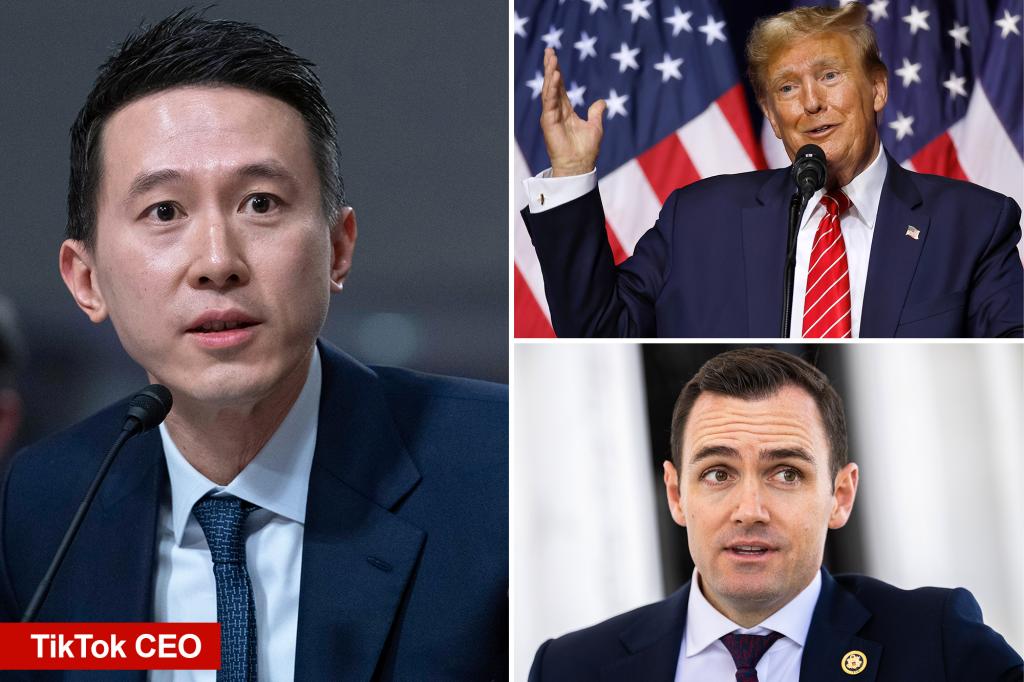
A House bill requiring TikTok’s China-based owner to sell it or face a total US ban is speeding toward a vote this week – and the wildly popular video app’s risks to national security are at the forefront of a fierce political debate about whether it should become law.
TikTok’s congressional critics were given fresh fodder ahead of an expected House floor vote on Wednesday after a bombshell report by the Office of the Director of National Intelligence (DNI) concluded that the Chinese Communist Party has used the app to influence US elections.
US intelligence officials found that TikTok has played a role in “malign influence operations,” with “accounts run by a PRC propaganda arm reportedly targeted candidates from both political parties during the US midterm election cycle in 2022.”
The Chinese Communist Party “may attempt to influence the US elections in 2024 at some level because of its desire to sideline critics of China and magnify US societal divisions,” the report said.
“Even if Beijing sets limits on these activities, individuals not under its direct supervision may attempt election influence activities they perceive are in line with Beijing’s goals.”
TikTok — whose CEO Shou Chew answers to owner Beijing-based ByteDance, led by chairman Zhang Yiming — plans to put up a no-holds-barred legal fight before it even considers making a sale, which the company sees as a last resort, Bloomberg reported on Tuesday, citing sources familiar with the matter.
The bill, which would give TikTok parent ByteDance six months to divest or be banned, is one of the most significant threats the app has faced and advanced past a House committee in a rare 50-0 vote last week.
The DNI report added even more urgency for lawmakers who fear TikTok is a propaganda and spying tool for Beijing.
President Biden has signaled he would sign the bill if it came to his desk. Republican House Majority Leader Steve Scalise called it a “critical national security bill.”
But Trump – who pushed to ban TikTok during his lone term in office – has surprised the GOP’s China hawks by stating he now opposes the measure. The 2024 GOP presidential frontrunner admitted he sees TikTok as a national security threat but argued a ban would only benefit Instagram parent Meta.
“Without TikTok, you can make Facebook bigger, and I consider Facebook to be an enemy of the people,” Trump told CNBC.
Trump’s reversal reportedly came after he met with billionaire megadonor Jeff Yass, whose fund holds a massive $33 billion stake in ByteDance. As The Post reported, sources say Yass has been “bullying” lawmakers by threatening to withhold donations if they support the bill.
Kellyanne Conway, the former Trump aide, has reportedly been lobbying on TikTok’s behalf on Capitol Hill and has met with lawmakers at least 10 times in recent months, Politico reported.
To be sure, not everyone House is on board with the legislation. Rep. Thomas Massie (R-KY) described the bill as a “trojan horse” and asserted that it contains text that would give the president “the power to ban website sites, not just apps.”
Elon Musk, the billionaire owner of the social media firm X, chimed in to agree with Massie – writing that the law was “not just about TikTok, it is about censorship and government control!”
“If it were just about TikTok, it would only cite ‘foreign control’ as the issue, but it does not,’” Musk added.
Prominent progressive Democrats, including “Squad” members such as Reps. Alexandria Ocasio-Cortez and Cori Bush, have previously signaled they are against a TikTok ban.
The legislation also faces obstacles in the Senate. Among the bill’s critics in the GOP is Sen. Rand Paul (R-KY), who said he is “absolutely opposed to it” on freedom of speech grounds. Sen. Lindsey Graham (R-SC), who said he is “definitely conflicted” about whether it is the right solution to concerns about TikTok.
“Banning TikTok, maybe that’s necessary to protect American data from China. But if you can find a way to avoid that, that’d be good, too,” Graham said during an appearance on NBC’s “Meet The Press.”
Majority Leader Chuck Schumer (D-NY) has yet to say whether he will bring the bill to the floor for a vote.
Elsewhere, TikTok has called the bill a de facto ban and taking the aggressive step of pushing its users to raise a stink with lawmakers on its behalf. The Chinese government has previously vowed to block any forced sale of TikTok.
If the bill is passed, TikTok is expected to by a hot target among the few large-cap firms with the resources to buy the company.
As The Post reported, rumors have swirled that bankers are already putting together bids in the event that TikTok hits the market.
Experts floated cloud-computing giant Oracle, which nearly bought TikTok when it last faced calls for a ban, as a potential suitor. Big Tech firms like Meta, Microsoft, Apple and Google were also floated as logical contenders.
Ex-Activision Blizzard boss Bobby Kotick reportedly approached ByteDance to express interest, the Wall Street Journal reported.

